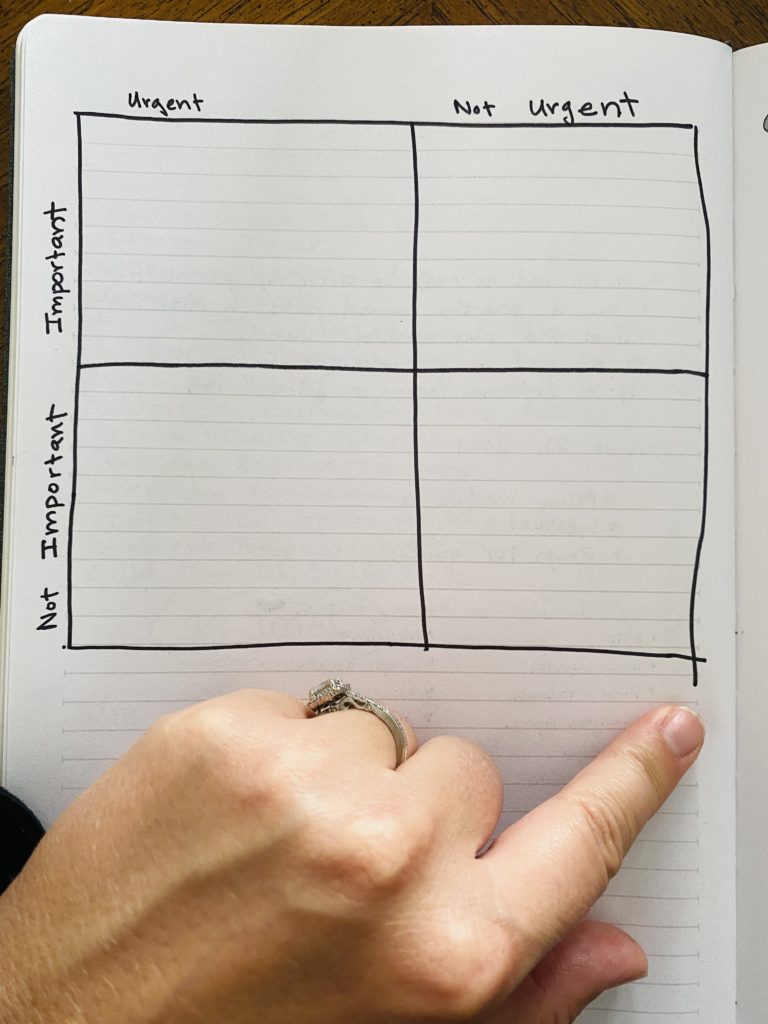
Apple Podcasts | Spotify | Stitcher
Stop! Don’t waste your time on that. I’m screaming this from the rooftop because I need to hear it too. Just today, I caught myself reorganizing file names in Google Drive. This little stint is a red flag of mine. Usually, I’m avoiding something that’s mentally challenging. When this happens I try to check myself by asking, “Is this the most important thing you should be doing right now, Jessie?”
Learn from my mistakes friend, and get really clear on what tasks deserve your limited time and energy before jumping into action mode. Eisenhower’s Urgent and Important Matrix has been an incredible tool to clarify what is most important, and how I should consider dishing out my time. If you’ve used Eisenhower’s matrix before, I urge you to still write down your items. Pen to paper is much more powerful than simply going through your to-do list in your head.
How to create the matrix on paper
Begin with a clean sheet of paper and draw a large square. Divide your square into four equal sections so you’re left with a 2X2 grid. You’ll then label your rows and columns like the picture below. Once you have your grid setup you’re ready to start inputting the tasks you need to get done!

Intentionally place daily tasks into the matrix
Pull out your to-do list for the week. What’s on it? Add each item into the matrix where you think it should go. There’s no right or wrong way to do this. Everyone will value different aspects of their jobs. You may make time for something that someone else will view as unimportant. No one is right or wrong in how they do this. Let me break down each quadrant a little further.
Urgent and important tasks should get done right away
What needs to be done NOW? These are tasks that are related to a crisis or have a deadline today. One thing that will help alleviate stress is finding ways to reduce the number of items in your “Urgent and Important” quadrant. To do this, you’ll want to dig into your “Not Urgent but Important” quadrant. If you tackle those items skillfully, they shouldn’t make their way into any other area. I’ll explain this further in the next section, so stay with me!Sustainable routines mean freeing up my energy. By having simple, sustainable routines, I don’t have to be the one keeping everything going in the classroom. If I could be gone for an entire day, and everything could just run on its own – that would be the dream! With time and energy freed up, I am able to build more relationships with my students and with my colleagues.
Not urgent but important tasks should get scheduled
Scheduling time for specific tasks is the best way to make sure you’re making time for them! These types of tasks should include the essential duties of your job. I’m talking lesson planning, feedback/grading, family communication, and internal emails. These are all part of the teaching gig, and they’re important. Choose a specific time to tackle these tasks weekly before they wind up in your “Urgent and Important” quadrant.
This quadrant can also include your professional interests and goals. For example, I love reading The Cult of Pedagogy’s bi-weekly blog posts for new ideas and pulling open my teaching strategy books to freshen up on topics. Learning new skills and techniques is important to me, but I wouldn’t consider it urgent. I schedule a small chunk of learning time every week. On the weeks I don’t schedule it I never get to it. That’s why scheduling is so crucial!
Not important but urgent tasks can be delegated
Sharpening pencils, passing out papers, stacking chairs, and updating different things around my classroom are tasks I deem not important, but urgent. These are little things that have to get done. Without sharpened pencils, my day would be a nightmare. Our wonderful custodian would not be happy if chairs weren’t stacked at the end of the day.
Yes, these are urgent, but that doesn’t mean I need to do them myself. Delegate whenever you possibly can. I train my students to do almost everything to keep our classroom rolling. Students love to take ownership of their role, and I’m able to give my limited energy to fostering student relationships. Lean on your PTO or other volunteers if that’s an option as well.
Not important or urgent tasks should be eliminated
If you’re reading this blog post, I’m going to assume you’re not interested in working late nights or weekends. If that’s true, you need to let go of tasks that aren’t important or urgent. As I said earlier, we are all different humans with different interests and values. Before I get to some examples of these types of tasks FOR ME, know that you get to choose your own path.
Gorgeous, Pinterest-worthy decor is in my “Not Important and Not Urgent” quadrant. Of course, I would love to have a stinkin’ cute space! However, I’m not willing to work late during the week or give up some time on the weekend to make it happen. As I said before if you love creating different items for your classroom and it sounds like a great weekend plan – go for it! Do what lights you up. I’m merely giving myself permission to not have to do it.
Writing personal messages to my students every single day is also in this quadrant. I love the idea of this so much, and I think it would be incredible for any child. However, the idea of doing that every day sounds incredibly difficult for me. I would rather show up for my students in a way that is more true to me.
Take a moment now to think of one or two things you’ve done in the past that you felt you just had to do. What were they? How did you feel when you were doing them? I know for me, I can still feel how the resentment in my body felt as I was doing that task. No “extra” item is worth it if you’re filled with resentment or dread.
How to move forward with your matrix
Now that you have all of your tasks on this urgent and important matrix, you should have a really clear visual of what has to get done and when. Take out that planner and schedule in all those “Not Urgent and Important” tasks for the upcoming week(s). Then jump right in and complete all the “Urgent and Important” stuff right away!
I usually use this matrix every Friday. This allows me to reflect on what I did this past week and take a peek at what’s coming up next. With a clearer sense of direction, I fill in my matrix with to-do list items I’ve been collecting throughout the week. When I walk out the door on Friday I feel grounded knowing that all my thoughts are captured on paper.
This also helps me avoid the Sunday scaries. When I walk into school on Monday I already know exactly what I need to work on and when. I strongly recommend this approach to everyone!!
Google images have tons of additional visuals for the Eisenhower Matrix. I still pull it up to see what other notes and suggestions authors have given for each quadrant. Type “Eisenhower Matrix” into Google, pull up the images, and take just a minute or two to get some more inspo.
One more tool that has saved me hours of time
Weekly family newsletters are one of the tasks in my “Not Urgent and Important” quadrant. For years, I struggled to consistently deliver a quality newsletter to my families. My updates were either too long, unhelpful, boring, or too infrequent (even if they were good – families were already used to deleting them before reading).
I was sick of struggling so dang much that I made it one of my official professional goals. Now I pump out helpful, readable, and engaging newsletters every week. The best part… It only takes me about 20 minutes each month to create them! There are a few things I put in place first and then the remainder of the school year is a piece of cake. Click here and I’ll send it to ya!
All the Good Stuff




+ show Comments
- Hide Comments
add a comment